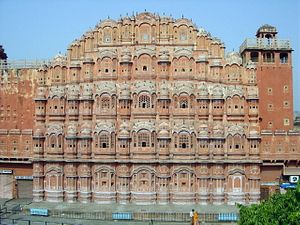Every year thousands flock to the “pink city” of Jaipur, the capital of Rajasthan, to attend the literary festival. First organized in 2006, the festival has quickly established itself as a literary Mecca. Novelist Jhumpa Lahiri, philosopher Michael Sandel and classicist Mary Beard were among the roll call of luminaries speaking at this year’s event, with the topics discussed ranging from the art of biography writing to symmetry. The festival, free to attend, attracted a record 220,000 listeners across five days, making Jaipur the largest literary festival in the world.
Nobel-laureate Amartya Sen kicked off proceedings with a puckish keynote address. In it he outlined a seven-point vision for a better India, one that included a strong and secular right-wing party and that reserved more space for the arts and humanities in public life. The festival’s program was similarly diverse, with themes ranging from India’s disappearing languages to women’s rights.
Forecasting the country’s future, historian William Dalrymple, Pulitzer prize-winning journalist Mark Mazzetti and filmmaker Ben Anderson discussed Afghanistan after the withdrawal of international troops. The changes that have come about since the start of the war in 2001 are “irreversible and unsustainable” said Barnett Rubin, former advisor to the U.S. Special Representative for Afghanistan and Pakistan, a paradox that makes the country’s future uncertain and unpredictable. All agreed that the coming months will produce crucial tests for the country’s administration and nascent military.
The specter of a resurgent Taliban looms large. The International Security Assistance Force will leave behind an army that “makes the Taliban look like the good guys” said Ben Anderson. With Washington, Kabul, and the Taliban all in disagreement over the shape and structure of peace talks, the likely outcome of the exodus of international troops, Anderson warned, is a descent into civil war between the Kabul-administered north and Taliban-controlled south.
With Washington fatigued by its longest conquest, regional powers will need to fill the gap created by receding U.S. involvement, explained Mark Mazzetti. China, India and Pakistan – all keen to exploit economic opportunities in Afghanistan – will have to cooperate to ensure stability and security if they are to realize their interests.
Questions of great power status have long dominated the discourses surrounding India and China. In a session entitled “Who will rule the world?” Professor Rana Mitter, of the University of Oxford, laid out China’s incontrovertible candidacy for superpower status. But China’s rise will be limited to the economic and military spheres. As Xiaolu Guo, a celebrated Chinese novelist and filmmaker, added, the 21st century “will continue to belong to American culture.” Rarely heard cautionary voices came from the session’s two Indian panelists. Professor Dipankar Gupta, one of India’s leading sociologists, said India must learn to “rule itself” before “ruling the world.” He advocated the “Nordic model” of growth; one that aims to secure individual autonomy, social mobility, human rights and economic stability through “social capitalism.”
It was left to the economist Meghnad Desai to ask, “Why be a superpower at all?” Global dominance is a dangerous and expensive endeavor and the U.S. example (of bankruptcy through war, democracy promotion and financial excess), he argued, should be enough to deter any aspirant state from seeking to do the same. Looking beyond nation states he insisted, “The future belongs to technology, capitalism and modern-European culture.”
The global order, and concerns about its health, was central to a session on the “Collapse of Globalism.” Hubert Vedrine, the French socialist politician, lamented the lack of a liberal international order, guided by supra-national organizations and the values contained in the UN charter. This sentiment was echoed by David Cameron, the British Prime Minister, who, in his address to the World Economic Forum a few days ago, stressed the need to “make a success of globalization.” Writer John Ralston noted the shift away from globalism towards regionalism, but both framed their views in liberal-economic terms, failing to ask whether Euro-centric liberal-institutionalism met the needs and interests of the developing world.
With a general election mere months away India’s democracy was, rightly, a central theme of this year’s festival. Through a series “Democracy Dialogues” sessions, speakers were invited to address the issues such as “Why India Votes,” “India at a Crossroads,” and the “Paradoxes of Growth and Development.”
What problems does India face in the run-up to the polls? Corruption, the criminality of India’s political class, and the lack of intra-party democracy, said Pavan Varma during a debate on “Raj aur Samaj: Democracy and the People.” Euphemistically dubbed “money power, muscle power, and network power,” the last of these was thrown into sharp relief during the festival as it was announced that India’s Congress Party would “elect” a Prime Minister after coming to power, in the unlikely event of success at the national polls.
For several years the Jaipur Literary Festival has been the subject of controversies. This year there was no such drama to detract from the quality of 175 sessions, across which more than 260 panelists spoke to hundreds of thousands of attendees. Capitalizing on its most successful year yet, the festival ended with an announcement of next year’s dates – January 21 to 25 – and confirmation that Nobel-laureate V.S. Naipul is set to attend.

































